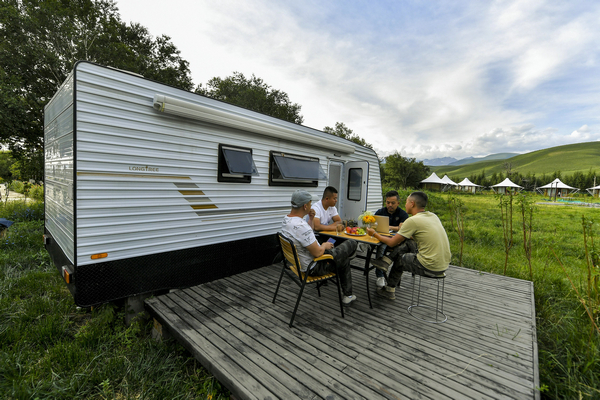Self-driving the new way to holiday
Getting behind the wheel surged as a preferred travel option during the COVID-19 outbreak


Economic benefits
The prosperous self-driving market is not only a result of tightened travel policies during the COVID-19 outbreak, but an inevitable result of the country's developing economy and people's desire for a better life.
Guanyan Tianxia, a consulting company headquartered in Beijing, released an industry report in October saying that the self-driving market is estimated to reach 125.3 billion yuan this year, a year-on-year rise of 10.4 percent.
Rising car ownership and the number of drivers, in addition to people's growing preference for self-driving trips, are vital to the development of the market.
Figures from the Ministry of Public Security said 360 million vehicles were registered nationwide through June 2020, with automobiles comprising 270 million of that number. In 2019, the number of registered automobiles was 260 million.
The growing automobile market includes products centered around self-driving. Their development has also brought tremendous benefits to the nation's economy.
Dai Huihui, the academy's associate researcher, said the growing self-driving sector has boosted industries including car rentals, motels, car maintenance and insurance, as well as the construction of camping sites.
Xie Yingmin, chairman of Shandong's Self-driving Tourism Association, said that once people go for a self-driving tour, they will have many more after experiencing the sense of and happiness the trips bring.
"Driving cars for travel can also boost custom for tourist attractions, gas stations and the insurance industry," he said.
Xie took Shandong province as an example. During the eight-day National Day holiday break last year, self-driving travelers went for three-day tours and spent about 5,000 yuan on average.
Figures from the province's transportation bureau show that about 21 million cars passed through the province's expressways over the break, 30 percent of which were manned by self-driving travelers.
"We multiplied the number of self-driving cars by three days, the average length they spent on trips, and concluded that self-driving tours brought in over 30 billion yuan to the province," he said.
Official support
Allowing for the tremendous potential of the self-driving sector, the government has released notices that offer guidance to industry insiders operating in the sector.
In 2019, the General Office of the State Council launched a notice to boost consumption concerning culture and tourism. In the notice, the council encouraged administrative units and companies to improve their self-driving services while developing products that are more appealing to travelers.
The Ministry of Culture and Tourism also released standards to classify self-driving destinations and camping sites for recreational cars in September 2019. The standards require higher quality of self-driving planning, public services and emergency responses, and are of great significance to the improvement of the nation's self-driving industry.
Preferential policies are also available to self-driving travelers. For example, the Ningxia Hui autonomous region in northwestern China has offered over 20,000 coupons nationwide to self-drivers, who can enjoy discounts on tickets to A-rated attractions for an unlimited number of uses in one year.
Travelers can also receive discounts on services including accommodations, laundry and car parking in the region by using the coupons.
"With COVID-19 vaccination in process and tourism in recovery, Chinese people will show an ever-stronger desire for traveling to 'find their trips back' this year," said Dai Huihui, the researcher.
"Travelers will stress ways to enjoy higher-quality traveling, thus making self-driving more popular in coming years. The government and travel agencies alike are making efforts to promote quality development of the self-driving industry by organizing industrial associations and planning more attractive routes and products."
Lu Lu, vice-chairman of the China Tourism Automobile and Cruise Association, said at a conference held in Jiangsu province in August that the domestic self-driving sector has a promising future even after the COVID-19 pandemic.
Lu said the sector can grow to be a main driver for tourism development while still continuously meeting people's increasing needs for quality services.
chengsi@chinadaily.com.cn




































